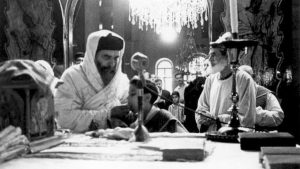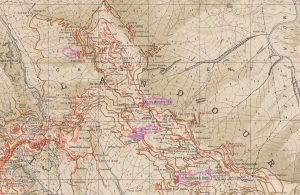I do believe that I have stumbled upon a new favourite author.
Andrew Wilson.
My appetite was whet in 2023 by his Incomparable and since then I’ve been making a meal of it.
the appetizer

This book booklet is just 64 pages! Eleven chapters, each of which could be read aloud in less than five minutes.
One of my biggest regrets as a teacher in those early years is that I did not spend enough time helping shape the convictions of students regarding the Scriptures. I assumed them too much, rather than articulating them. Big mistake. While trends and techniques captivate us, they do tend to come and go. It is really only the eternal that can be forever contemporary. That is the world where convictions about Scripture live. And more than it being about us holding on to them, they can hold on to us—for a lifetime.
Wilson teases open many of these convictions as they relate to the Scriptures: authority, inspiration, coherence, clarity, sufficiency etc.
the main course
The big idea of this book is that 1776, more than any other year in the last millennium, is the year that made us who we are (7).
“Yeah, right”. My initial response to that sentence dripped with scepticism. It sounds like such a preposterous claim. And then a little mutter, “not 1776—again”. I was raised in an American educational system where 1776, and the Declaration of Independence, was drummed into us. But Wilson silenced me just two pages later: “it is only fair to point out that much of this book is not about America at all” (9).

Yes, what Wilson attempts in this book is scarcely believable. First he defines our (post-Christian) society with the acronym WEIRDER—Western, Educated, Industralized, Rich, Democratic, Ex-Christian, Romantic—and then he argues, one chapter at a time, that “all seven of these things are true because of things that happened in 1776” (8).
He pulls it off—and he does so with such aplomb, as such a witty storyteller.
At one point he asks a couple of great questions: “But why is Europe so fragmented? Why has it not fallen subject to a dominant imperial power since Rome?” (237). His response?
It is mostly a matter of maps, not chaps (237-238).
Or, when he talks about ‘the legacy of the Enlightenment’, he notes that Jane Austen was “two weeks old at the start of 1776” (124). Who would even pursue such trivia? From her writings, it would appear that Austen could not be further from the likes of Kant and Hume, and yet “the gap is much smaller than it appears” (125). Wilson makes his case and then concludes the chapter in this manner:
The Western world has been illuminated by their powerful blend of sense and sensibility, and their laudable commitment to persuasion—but we have also been darkened by their pride, and prejudice (126).
That beings me such joy. Mind you, I’d love to see him write a companion volume on how the world beyond ‘the West’ has shaped us. This story here, epic though it is, feels incomplete. For example, my mind wanders to William Dalrymple’s recent attempt to demonstrate ‘how ancient India transformed the world’ in The Golden Road. Maybe a blog on that one a bit later…
In the meantime, here is a 6.27min ‘mini-documentary’ that introduces the book:
the dessert

All those features which I enjoyed about Incomparable—’brief, accessible, full, fresh, needed’—re-emerge here with Gospel Stories. And who is ever going to complain about desserts and appetizers being similar…? Sounds a scrummy idea to me.
Here the focus shifts from the character of God to the gospel story and ‘how (this) greatest story is richer, deeper and more wonderful than we think’. This time the sub-5-minute scripts reflect on 57 key Bible passages across the ‘five acts’ of the story: Creation and Fall; Israel and History; Poets and Prophets; Jesus and Rescue; Restoration and Hope. I like that division, as far too many similar approaches accelerate through the Old Testament part of the story.
The back cover expresses it well:
Just as there is one God in three persons, and one church made up of many people, so in Scripture there is one gospel made up of many stories.
In recent years I have discovered this to be such a compelling part of the Bible: ‘one gospel made up of many stories’. It is incredible. Over hundreds of years, with dozens of human authors (and a fair few different genre as well, I might add), a demonstrably single story is being told. It gives me such confidence that when I hold the Bible in my hands, I am encountering the word of the living God.
… and now my taste buds are turned towards
the after dinner mints
I have only got as far as the dessert—but these mints are in my sights…

nice chatting
Paul
About Me

the art of unpacking
After a childhood in India, a theological training in the USA and a pastoral ministry in Southland (New Zealand), I spent twenty years in theological education in New Zealand — first at Laidlaw College and then at Carey Baptist College, where I served as principal. In 2009 I began working with Langham Partnership and since 2013 I have been the Programme Director (Langham Preaching). Through it all I've cherished the experience of the 'gracious hand of God upon me' and I've relished the opportunity to 'unpack', or exegete, all that I encounter in my walk through life with Jesus.
Recent Posts
Football helps me train preachers. See, when you speak to me about football—or, ‘footie’—I need to know where your feet are before I can understand what you mean. Are your feet in Ireland, or Brazil, or the USA, or NZ—or in crazy Australia? It must be the most fanatical sporting nation in the world. Within…
Having been born in 1959, I don’t remember much about the 1960s. But I have heard a lot. Hippies. Drugs. Rock ‘n Roll. Assassinations. Moon-walking. A quick trip across to ChatGPT informs me immediately that it was ‘a transformative decade across the world’—marked by the civil rights and feminist movements, Cold War tensions, consumerism and…







